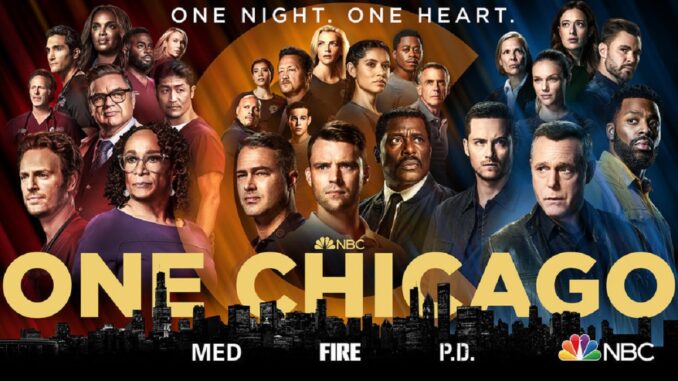
Behind the Blue Flame: How NBC Forged the One Chicago Dynasty
The television landscape is littered with ambitious franchises that fizzled, or standalone hits that never quite spawned a universe. Yet, amidst this graveyard of good intentions, one multi-series juggernaut reigns supreme, a weekly appointment for millions: One Chicago. What began as a single drama about firefighters has blossomed into an interconnected web of heroism, sacrifice, and the unwavering spirit of a great American city. This wasn't accidental; it was a masterclass in strategic storytelling, meticulous world-building, and shrewd network programming, a deliberate alchemy orchestrated largely by the indefatigable Dick Wolf and NBC's discerning eye.
The genesis of One Chicago lies, predictably, in the formidable mind of Dick Wolf. Having already redefined the legal procedural with the enduring Law & Order franchise, Wolf brought a proven blueprint to the table: an unwavering commitment to authenticity, a focus on the gritty realities of public service, and a belief in the power of the "case of the week" married to slow-burn character development. However, where Law & Order often focused on the system, One Chicago would dive deeper into the soul of the people operating within it.
The initial spark, Chicago Fire, was a calculated risk. Unlike the well-trodden streets of New York, Chicago offered a fresh urban canvas – a city renowned for its blue-collar ethos, its resilience, and its vibrant, distinct neighborhoods. This choice of setting was pivotal, almost a character in itself. The production committed to filming extensively on location, eschewing soundstage fakery for the visceral reality of Engine 51's firehouse, the bustling streets, and the iconic skyline. This wasn't just aesthetic; it was an investment in verisimilitude. Consultants from the Chicago Fire Department were embedded in the writing process, ensuring that the procedures, the jargon, and the very culture depicted on screen rang true, lending an unshakeable credibility that instantly resonated with audiences.
Once Chicago Fire ignited, the blueprint for the franchise began to unfold with remarkable precision. The expansion wasn't arbitrary; it was organic and logical, mirroring the real-world interconnectedness of emergency services. From the trauma of a fire scene, characters naturally encountered the police (leading to Chicago P.D.), and the injured found their way to the emergency room (birthing Chicago Med). This sequential expansion was brilliant in its simplicity, creating a narrative gravitational pull that subtly nudged viewers of one show towards the others.
But the true genius of the One Chicago construct lay in its seamless cross-pollination. Unlike many shared universes where crossovers feel forced or infrequent, One Chicago made them a foundational element. A fire that starts on Fire might lead to a criminal investigation on P.D. and a medical emergency on Med. Characters from different departments didn't just meet for event specials; they shared family meals, had romantic relationships, and offered comfort during moments of professional crisis. This interweaving of personal and professional lives created a rich, intricate tapestry, making the city feel like a real, living organism rather than a collection of disparate sets. It fostered a sense of a larger, shared community, where the stakes were amplified because the audience knew the consequences would ripple across all three shows, affecting characters they had grown to love on a deeply personal level.
NBC, for its part, was a steadfast partner in this ambitious venture. Recognizing the power of the Wolf brand and the growing loyalty to the Chicago universe, the network made a strategic decision to consolidate the shows into a formidable Wednesday night block. "Chicago Wednesdays" became more than just a programming slot; it was an event, a promise of consistent, high-stakes drama. This scheduling genius meant viewers could immerse themselves in the entire universe without changing channels, fostering binge-watching tendencies before the term was even fully ubiquitous. The consistency bred familiarity, and familiarity bred loyalty, cementing One Chicago as an immovable fixture in the network's lineup.
Beyond the procedural elements, the enduring appeal of One Chicago lies in its beating heart: the characters. While each episode often presents a compelling case or crisis, the long-term emotional investment comes from watching these brave individuals navigate their personal lives – their triumphs, their heartbreaks, their moral quandaries, and their unyielding support for their chosen families. Whether it's the paternal guidance of Chief Boden, the fierce loyalty of Sergeant Voight, or the unwavering compassion of Dr. Halstead, these characters are archetypes of heroism and humanity, flawed yet deeply relatable. They are the bedrock upon which the entire edifice stands.
In essence, NBC didn't just stumble upon a hit; they methodically built a dynasty. They provided the resources, the platform, and the unwavering belief, while Dick Wolf supplied the architectural blueprint, the commitment to authenticity, and the narrative framework. The city of Chicago offered its soul, its grit, and its unparalleled backdrop. The result is a franchise that transcends mere entertainment, becoming a weekly exploration of heroism, community, and the human spirit under pressure – a shining example of how a carefully constructed universe can captivate millions, one blue flame, one siren, and one beating heart at a time.
